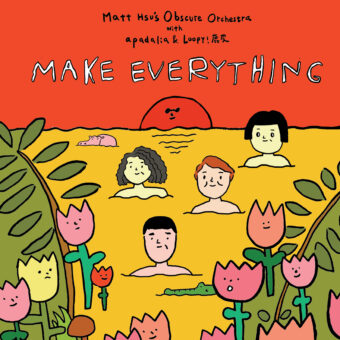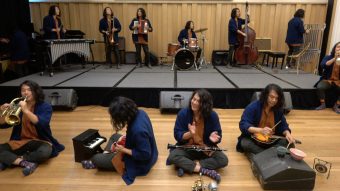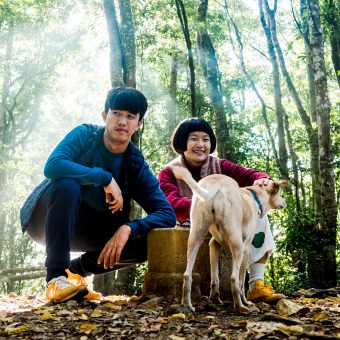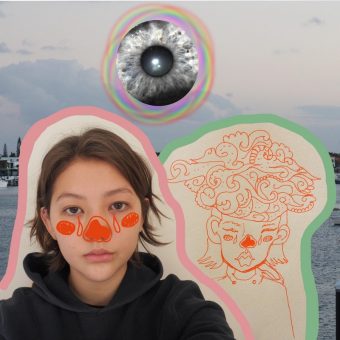
I decided on my artist name because no-one could pronounce my actual name.
The Matt part is easy, but the Hsu part is a struggle (it’s pronounced ‘shoo’). I figured if no-one could say it, no-one would remember it, so I tacked on an easier to remember ‘Obscure Orchestra’ to the end. It also provides a neat clue on what to expect from my music.
So there it is, I’m Matt Hsu’s Obscure Orchestra. Nice to meet you.
Anyway, I wrote this song. It goes, “I don’t want fame…”
Ironically, it won me a 2020 Queensland Music Award. A tune called ‘Make Everything’ where I collaborated with two Taiwanese non-musicians (Loopy! 鹿皮) and an immensely talented but largely undiscovered bedroom musician (apadalia).
When you’ve been quietly making music for years and you suddenly win a fancy award, it feels both exhilarating and comical. Making a speech in front of music industry folks who are wondering who you are, alongside icons you grew up listening to — Powderfinger, Regurgitator, Katie Noonan — feels like entering an alternate reality. While a part of me wanted to thank everyone in the room, I took the opportunity to talk about the gooey goodness of diversity in the arts.
We took out the ‘World Music’ category, a term I feel a bit weird about (bit ethnocentric lumping all non-western music into one category) but this isn’t that think-piece. I will at least say that being an Asian musician in a predominantly white culture comes with a funny pressure to put yourself in a convenient little box. I’ve noticed a strange dichotomy, an invisible set of instructions for Asians in music that plays out a bit like this:
Asian in an indie band: Don’t draw attention to your Asian-ness. Wear the same skinny jeans and Chucks/Vans/Docs that your white bandmates are wearing. No ‘ethnic’ stuff.*
*Unless your indie band has a hippy vibe, in which case, do culturally appropriate all the ‘ethnic’ stuff.
Asian making ‘world music’: Play up your Asian-ness wherever possible. Take off your everyday jeans and put on that traditional kimono looking thing and that vaguely spiritual looking necklace. Exoticise yourself to the point of parody.
Growing up in Sunnybank (a suburb widely appreciated as Brisbane’s ‘real Chinatown’), I remember seeing a lot of Asians who were only friends with other Asian people. In hindsight I see how comforting that haven of cultural familiarity was for immigrants, especially in face of racial taunts like ‘speak English!’ and ’go back to where you came from’. But at the time, I felt that only interacting within your own ‘race’ was narrow-minded and exclusionary to other cultures. So as I grew up, I actively sought out non-Asian friends. In my zeal to escape a monoculture, I ironically fell into another one.
I over-corrected, refusing to speak Mandarin at home and ended up with mostly white friends. I felt pride in being able to fit in better than my Asian peers who still spoke with accents from their homelands (missing the double-standard that ‘attractive’ foreign accents like Irish, Italian, French and Spanish are seldom told to ‘speak properly’). I had created a shield from racist attacks by donning a kind of white-on-the-inside privilege. But what felt like privilege was actually just internalised racism, which morphed into a kind of racial dysmorphia. To avoid being targeted as an ‘other’ I desperately tried to blend in with the dominant white culture — to escape victimisation by aligning myself with the perpetrators.

Music was pivotal to my moving past this. Little by little, my musical taste crept beyond angsty white dudes with guitars. I began listening to Afro-Cuban jazz, Polynesian folk, Japanese minimal sounds, Taiwanese indie, African pop, Romani Klezma, Middle-Eastern rock. I started meeting diverse artists who all unashamedly championed their heritage. As I discovered the myriad delights of music across cultures and met the people who made them, I began being able to come to grips with my own identity.
Discoveries about music became discoveries about myself. I began seeing cultural difference in terms of its exciting new artistic possibilities — not something to diminish and one-dimensionally exoticise, but cherish in all its nuance and complexity. The creation of ‘Make Everything’ became a subconscious encapsulation of that discovery. A bookend to my cultural self-acceptance.
Composing began when I placed all ten of my fingers on consecutive white keys of a piano and tinkled just my pinkies and thumbs (try, it’s pretty!). Then, I couldn’t stop adding other instruments and objects, as is what always happens when I compose. I threw the kitchen sink at it, literally. The music itself wasn’t overtly ‘eastern’ or ‘western’ sounding – it had hints of both. I manipulated a ukulele to sound like an eastern lute and struck mandolin strings with chopsticks to mimic a zither. I like that ambiguity because it reflects the transmutability of personal identity. Usually my songs are made wholly of organic sounds (instruments, field recordings, repurposed everyday objects) but at the time I’d been working with an experimental video game maker, Sophie Reid-Singer, who gave me a crash course in putting sounds ‘underwater’ using low-pass filters and other wobbly effects. I used that little dip into electronic manipulation for the intro and outro.
The lyrical theme came during a bike ride through my neighbourhood of West End while ruminating on why I enjoyed making music. Not for the attention and adulation of an imagined audience, but for the joy of experimenting and making something at my own pace, to be shared with friends. I had actually carved out space for three verses, with the intention of having two artists share their interpretation of what ‘making stuff’ means to them — which brings me to what I really love about this song: collaboration.

A couple years ago I’d stumbled upon Loopy! 鹿皮 at a DIY design market in Taipei during my first trip ‘home’ in over a decade. I was drawn to their cheeky whimsical art sensibilities and part of me wondered: if I had grown up in Taiwan, maybe my life would be a bit like this. They helped me dispel this narrow belief I’d developed in my teens, that all good Asian kids grow up to be lawyers, dentists and accountants, joylessly obsessed with status and money. Watching Gua Gua and Kuan Fu (the couple behind Loopy!) mischievously go about their lives making kooky wearable art completely smashed any lingering remnants of that belief. I immediately thought of Loopy for a verse. It didn’t matter that they’d never made music professionally, my mind was brimming at the possibilities of working with them, so I reached out. They jumped on board.

For the opening verse, I sought out apadalia, a new friend who I immediately related to in lots of ways. She’s a prolific and irrepressible music maker who pays no mind to whether anyone hears her music. She is also in the process of grappling with her mixed cultural heritage. I felt immense comfort knowing that someone who shared a culturally complex upbringing would bring another layer of depth to the song.
So with apadalia beginning the song, Loopy! in the middle and myself singing the final verse, ‘Make Everything’ was complete. I loved making this song with my collaborators. I’m happy it allowed me to speak about diversity in the arts and touch on the complex experiences of people of colour. I love that it’s a little anthem about the joy of creativity, and one which happened to be such a joy to create. Now that the frenetic excitement of the ceremony has calmed, what has distilled is a lovely poetry found in the fact that this most authentic addressing of myself, rendered in music, was what won an award.

